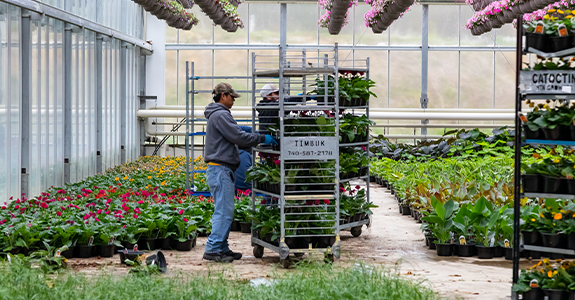Understanding horticulture and floriculture—and why specialized insurance matters
If you’re insured with Hortica®, a brand of the Sentry Insurance Group, your business is rooted in the horticulture or floriculture industry. These are unique fields. Not everyone knows what’s involved for your business to grow and thrive. However, your business insurance provider absolutely should.
As a niche insurance brand solely dedicated to the horticultural and floral industries, we're familiar with the unique challenges you face—and the opportunities in front of you.
In this guide, we review the differences between horticultural and floricultural businesses, and discuss how our unique approach to insuring businesses like yours can help protect your bottom line.
What is horticulture?
Horticulture is a multi-billion dollar industry that falls somewhere between domestic gardening and field agriculture. Science Direct describes it as the art and practice of garden cultivation and management.
Common horticulture crops
Crops in this industry typically include:
Fruits
Vegetables
Herbs
Nuts
Ornamental plants (trees, shrubs, flowering plants, and turf)
Horticulture industry trends
The horticulture industry is continually developing. Advancements in horticultural practices and greenhouse technology, plus the expansion of biotechnology and its plant application, is helping modernize and expand cultivation.
According to Dimension Market Research, the U.S. market for greenhouses was estimated at more than $10 billion in 2024, and is expected to grow to more than $24 billion by 2033.
What is floriculture?
Technically, floriculture—involving flowering and foliage plants—is a subset of horticulture. One industry, two distinct fields.
Floriculture, or flower farming, is a vibrant, multi-billion dollar field helping fuel the growth of the horticultural industry. It focuses on the cultivation and breeding of flowering and ornamental plants for gardens, landscaping, and floristry.
Common floriculture crops
Common crops in this industry include:
Bedding plants
Flowering garden and potted plants
Cut flowers
Cut cultivated greens
Floriculture industry trends
The flower and ornamental plants market is benefiting from advancements in plant biotechnology, such as genome sequencing, and modern flower farming practices. According to the U.S. Bureau of Economic Analysis, in 2024, total spending in the floral industry in the U.S. hit $71 million.
Common risks that horticulture and floriculture businesses face
While every business is different in the horticulture and floriculture industries, there are common risks that stretch across the board, including:
Property damage
Equipment failure
Commercial auto losses
Crop or inventory loss
Employee injuries
How we support horticulture and floriculture business
Working with a niche insurance provider who knows the risk exposures businesses like yours face can be a significant benefit to your bottom line.
We’re widely recognized within the horticulture and floriculture fields, with 135 years of serving these industries. We provide a full range of horticultural business insurance services, from in-house claims service to safety and risk management programs.
Businesses under the umbrella of horticulture and floriculture have unique characteristics—and our knowledge of these fields makes us uniquely capable of helping protect your business. Whether you're cultivating flowers or farming sod, our tailored insurance solutions can help cover your business and your employees.
Here are businesses we serve within the horticulture and floriculture industries and the corresponding insurance coverages we offer to help protect them:
Garden centers
Crop damage, storm damage, equipment failure, and workplace liability are some of the biggest garden center risk exposures you face. We have coverages to help protect your business and your property. Garden center insurance is designed to help protect your business and workers whether you grow your own stock, buy from others to sell, provide landscape services, operate from a traditional retail store, or have your own greenhouses.
Greenhouse growers
Whether you grow wholesale or retail, we can help protect your greenhouse from losses due to storm damage, crop failure, electrical fires, and equipment breakdown. Greenhouse insurance is designed to help protect your business and workers whether you grow under glass, polycarbonate, plastic, or acrylic; produce potted plants, vegetables, or specialty cuts; or sell plugs or finished products.
Nurseries and sod farms
Insurance for nurseries or sod farms is designed to help protect your business if you grow in containers, sell bare root stock or fully rooted plant material, brand your own sod, provide installation services, or sell direct or through distributors.
Retail, wholesale, and event florists
You’re juggling a lot—inventory, equipment, customers, and employees. Insurance for retail, wholesale, and event florists is designed to help protect your business income and workers—whether the majority of your sales are from wire services or walk-in customers, you own your building or rent, or you have multiple designers or are a one-person florist shop.
Landscapers and interior plantscapers
We have the specialized coverages that’ll help protect you and your lawn care or plantscaping business. Insurance for landscapers and interior plantscapers is designed to help protect your business and workers whether you have one crew or many; focus on residential jobs, commercial work, or both; or handle simple installations or complex design and build projects.
We’re here to help you and your business
Learn more about how our specialized insurance can benefit your business. Request a quote, email us, or give us a call at 800-851-7740 to speak with one of our representatives.
Related links:
Take a deep dive into commercial property insurance. Discover how this coverage protects your buildings, equipment, and inventory from threats, such as theft and severe weather.
Addressing daily hazards through regular training empowers your employees to work confidently and helps reduce accidents. A culture that values safety helps ensure your team and your horticultural business thrive.
Looking for ways to prevent employee distracted driving? Follow these defensive driving tips, safety expectations, and training strategies to help keep your drivers focused behind the wheel.
The information in this article is for informational or entertainment purposes only. View our disclaimer by going to terms and conditions and clicking on Learning Center disclaimer in the table of contents.
